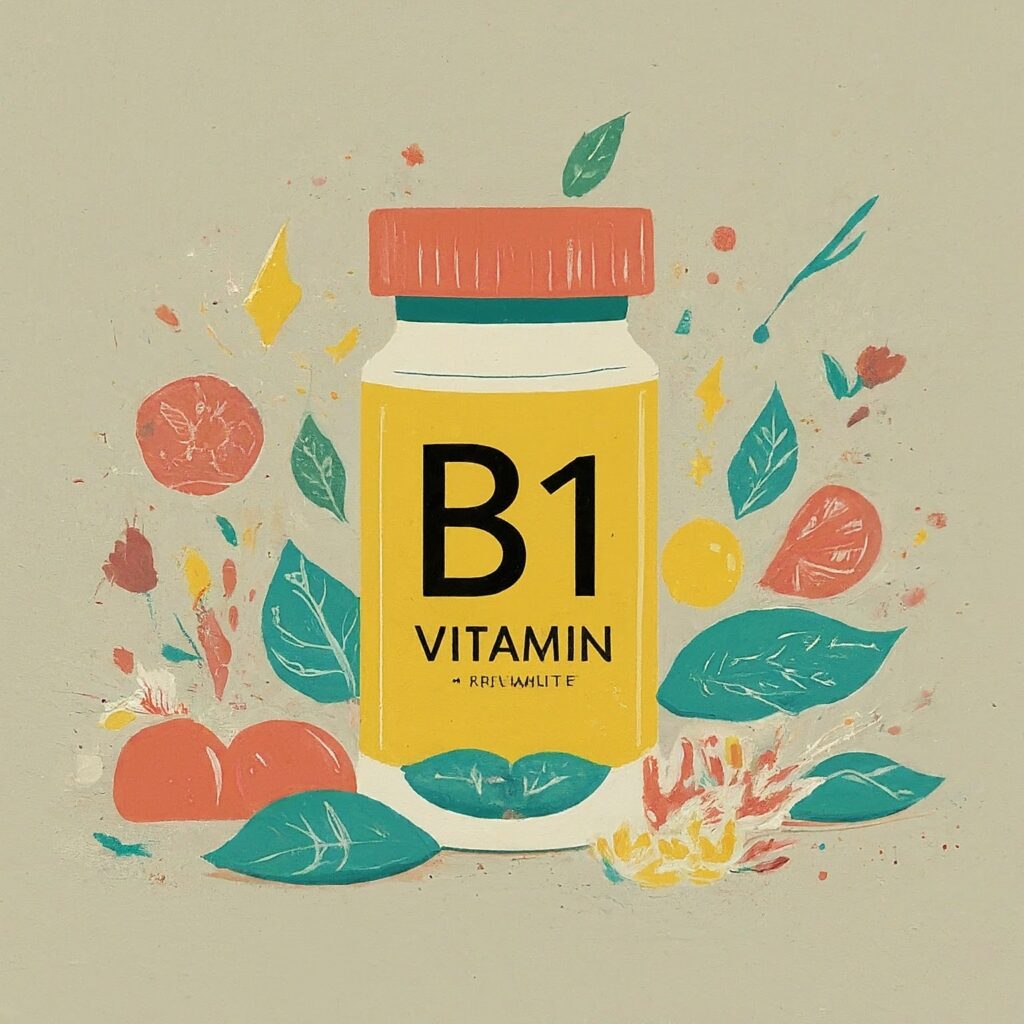Vitamin B1, also known as thiamine, is crucial for maintaining healthy nerve function, energy production, and overall well-being. A deficiency in this vital nutrient can lead to various unusual symptoms that might be easily overlooked. Here are 12 strange signs that your body needs more vitamin B1.
1. Nerve Pain in the Toes
One of the most common signs of a vitamin B1 deficiency is tingling, burning, or shooting pain in the toes or feet. Without enough vitamin B1, the coating around your longest nerves gets damaged, sending pain signals to your brain. High blood sugar levels or pre-diabetes often cause this condition.
2. Frequent Yawning
If you find yourself yawning frequently throughout the day, even after a good night’s sleep, it could be due to low energy levels from a lack of vitamin B1. This essential vitamin is needed for energy production at the cellular level. Foods rich in B1, like sunflower seeds, mussels, pork, or garlic, can help boost your energy levels.
3. Anxiety and Stress
Feeling stressed, tense, or constantly overthinking? Your nervous system might be in a “fight or flight” state, which depletes your vitamin B1 stores. This can lead to chronic anxiety, sleeping problems, panic attacks, and even depression. Increasing your intake of vitamin B1 and magnesium can help alleviate these symptoms.
4. Fast Heartbeat
Vitamin B1 plays a vital role in energy production within your cells, crucial for regulating your heartbeat and respiration. A deficiency can cause your heart to work harder, leading to a faster heart rate. This condition is often exacerbated by excessive caffeine consumption from energy drinks, coffee, or soda.
5. Swelling and Poor Circulation
Vitamin B1 helps protect the inner lining of your arteries from free radical damage. Without sufficient B1, your blood vessels are more prone to damage, causing swelling, fluid retention, and edema, especially in the feet and ankles. Alcohol consumption and a diet high in refined carbohydrates can contribute to this issue.
6. Acid Reflux
Vitamin B1 is essential for the proper functioning of the muscle above your stomach, which helps prevent acid from rising into your esophagus. A deficiency can cause this valve to remain open, leading to acid reflux, inflammation, and a burning sensation in your throat.
7. Completely White or Blue Nails
If your nails turn completely white or blue, it might indicate a severe vitamin B1 deficiency. This symptom can also signal anemia, liver cirrhosis, or heart failure. Ensuring adequate vitamin B1 intake can help maintain healthy nail color and overall nail health.
8. Wide Walking Pattern
A severe vitamin B1 deficiency can cause muscle weakness and loss of coordination in your legs. This often results in a wide walking pattern with shorter steps and slight foot dragging due to damaged nerve coatings.
9. Poor Navigation
The hippocampus and cerebellum, brain regions responsible for navigation and spatial awareness, require significant amounts of vitamin B1. A deficiency can lead to problems with finding directions, navigating, and even a reliance on GPS. Early studies suggest a link between low vitamin B1 and Alzheimer’s disease.
10. Hyperactivity
Both children and adults can exhibit hyperactivity, irritability, and conditions like ADHD, OCD, and Tourette’s without enough vitamin B1. This vitamin helps regulate energy flow through neurons, calming the brain and nervous system.
11. Over or Under Sweating
A vitamin B1 deficiency can disrupt your body’s ability to adapt to different temperatures, leading to excessive sweating or lack of sweating. B1 is involved in the autonomic nervous system, which regulates these processes.
12. Restless Legs
An overwhelming urge to move your legs at night or an irritating crawling sensation can indicate low levels of vitamin B1. This deficiency overexcites nerves, causing restlessness. Alcohol, certain medications, and high sugar intake can exacerbate this condition.
Additional Symptom: Diabetes
Diabetics are often deficient in vitamin B1 as their bodies deplete it to manage high blood sugar levels. Regularly taking a high-quality natural B1 supplement, like alithiamine or benfotiamine, along with a natural B complex from nutritional yeast, can reduce the risk of nerve damage and tissue death from high blood sugars.
Testing for Vitamin B1
A simple blood test may not accurately reflect your vitamin B1 levels, as less than 1% is stored in the blood. Observing your body’s signs and symptoms is crucial to understanding your deficiency and addressing it.
Why Am I Low in Vitamin B1?
Several factors can deplete your vitamin B1 levels:
– Alcoholic drinks: Quickly deplete vitamin B1 and block its absorption in the small intestine.
– Carbs or sugary foods: These convert to blood sugars, using up B1 stores for energy conversion.
– Caffeine and tannin: Found in coffee, tea, soda, and energy drinks, these overstimulate nerves, using more B1.
– Long-term stress: Increases adrenaline or cortisol, depleting B1.
– High-sulfite foods: Such as wine, gravies, or dried fruits, damage gut bacteria that produce B1.
– Certain drugs: Antacids, antibiotics, birth control, and diabetes medications can deplete B1.

How to Boost Vitamin B1 Levels
1. Nutritional yeast: Eat at least three tablespoons daily for the best natural source of B1.
2. B1-rich foods: Sunflower seeds, organic pork, wild salmon, garlic, asparagus, squash, and mussels.
3. Alithiamine supplement: 50 mg of fat-soluble B1 daily.
4. Benfotiamine: For nerve problems, take 300 mg twice daily.
5. Avoid alcohol and sugar: These deplete B1 stores.
6. Switch to healthier rice: Use cauliflower rice or wild rice instead of white rice.
7. Boost gut bacteria: Eat foods rich in lactobacillus and Saccharomyces like sauerkraut, kefir, kimchi, miso, tempeh, pickles, and soluble fiber from vegetables, seeds, nuts, and berries.
Supplements to Avoid
Avoid thiamine mononitrate or thiamine hydrochloride long term due to potential toxins from manufacturing. Stick with nutritional yeast, alithiamine, or benfotiamine for the best results.
Boosting your vitamin B1 levels can significantly improve your health and alleviate many of these strange symptoms. For more information on vitamins to repair your nerves, check out the video link provided.